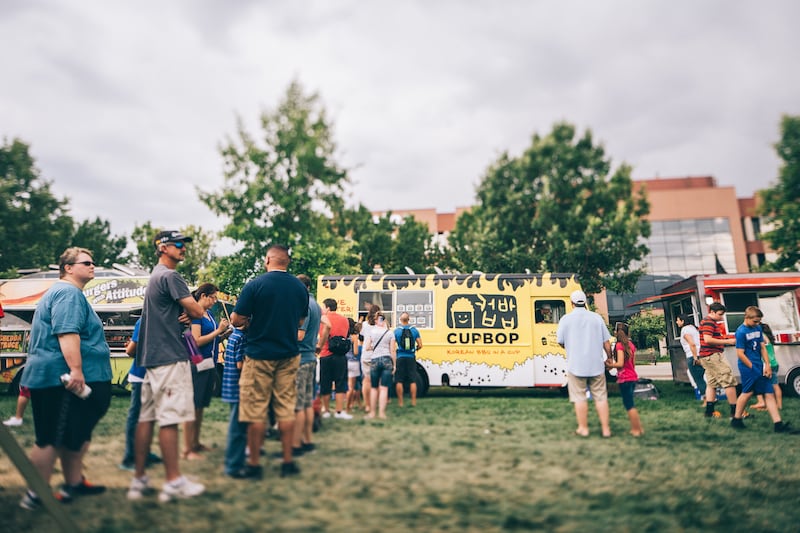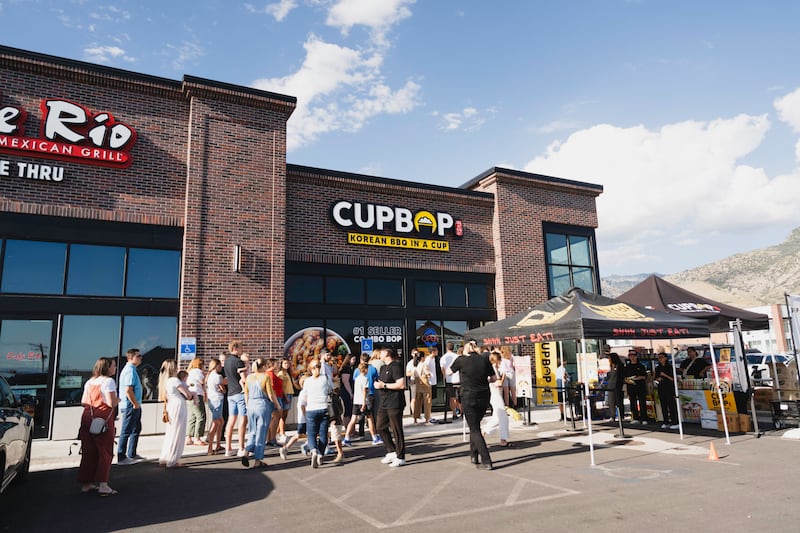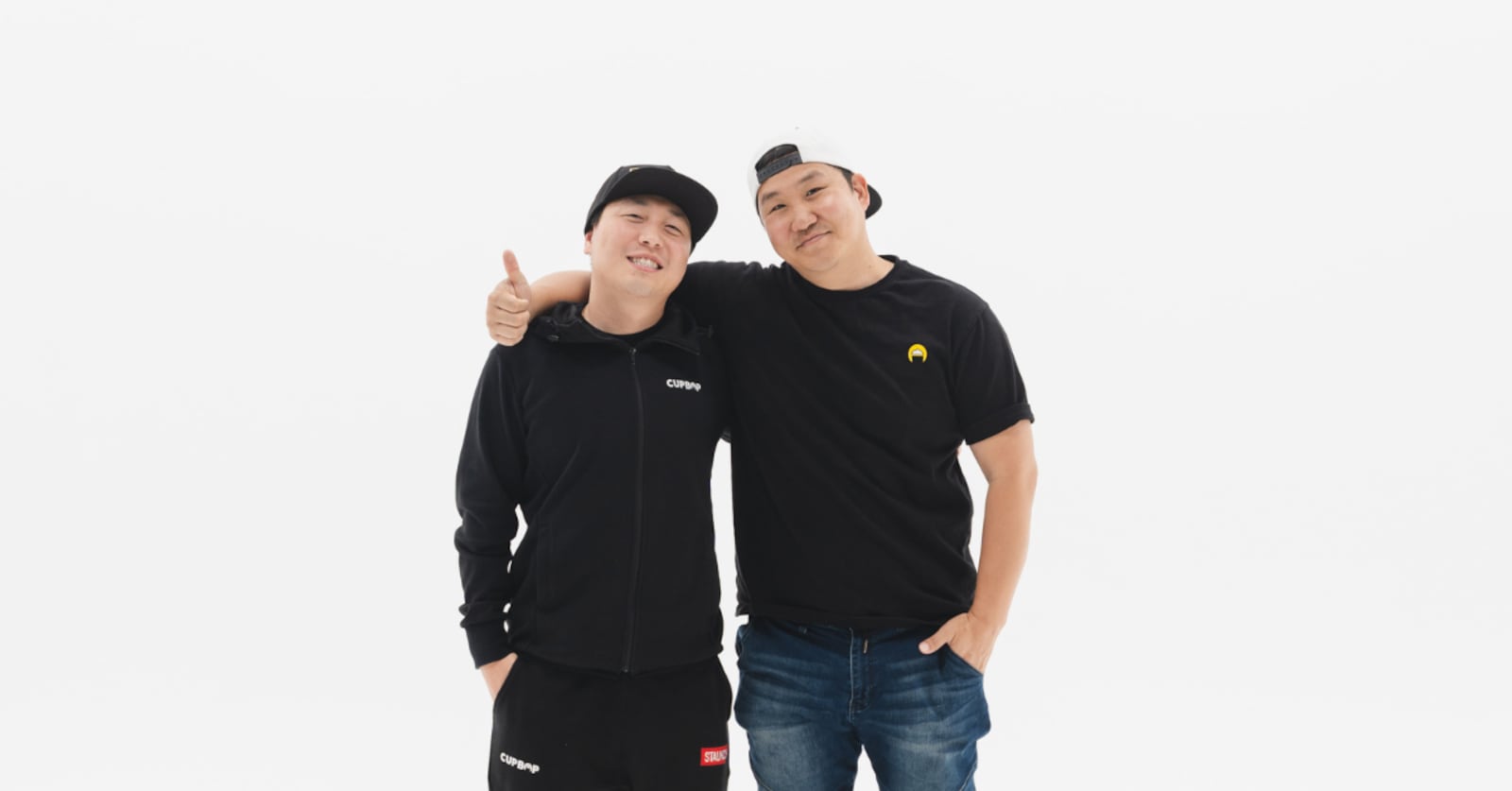In 2013, I started with a single food truck in downtown Salt Lake City near the Gallivan Center. Business was hard at first, but I had a lot of passion for what I was building. As the dad of five kids, I had to cook a lot of rice! They were my motivation.
But when I started selling to our early customers, they were unfamiliar with our menu. It was a new style of Korean barbecue served in a cup, and they didn’t like it. Some bought it, smelled it and threw it in the trash without taking a single taste. I was hurt when I saw that happen. When I asked them why they did that, they said it was because they didn’t know what kind of food it was.
Engaging with customers, on the other hand? That worked. I started drawing on my former life as a breakdancer—dancing, yelling into a microphone and taking photos with customers. Cupbop turned into less of a restaurant and more of an experience. People said things like, “Oh! This Korean guy is funny! This Korean guy can smile! I want to come back!”
More than just a meal
Soon enough, people wanted to introduce Cupbop to their friends and share it with their coworkers. The line for our truck got a lot longer. The media noticed what was happening and put us on TV. People posted about what we were doing online. It was no overnight success, but our reputation built quickly.
I learned that the relationship you form with your customer is even more important than the food you create. When they began connecting with me, the food became more familiar and friendly to them. Comments went from, “Oh, I like this guy. Let me try his food.” to “Oh, that’s pretty good. I love this guy! I love the food!” That’s how we started Cupbop.
Part of our success came from turning traditional Asian stereotypes of restaurant owners upside-down. It’s typical for Asian restaurants to have really good food, but they may hesitate to engage with customers due to a language barrier and feel uncomfortable communicating. At Cupbop, we decided to push past those norms by making it an enjoyable and interactive experience for everyone, which helped attract and keep customers.

Order up!
When I started thinking about what kind of menu to offer, I knew it was going to be Korean barbecue, but I wanted to make it simpler. Instead of going all-out authentic with a new world of flavors, I decided to give the experience a twist in hopes it would feel fresh yet familiar.
I can make authentic Korean barbecue for anyone who wants it because I was born in Korea and was raised by Koreans. But when it came to opening my business here, I had to match my audience by catering to their tastes. When I go to Taco Bell and Panda Express, I see all of my American friends eating there. I knew that’s who we needed to cater to and who I was making food for.
Lucky for me, they liked it a lot. The biggest reason we decided to grow beyond a single food truck was because of all the complaints—even though I would prepare enough food for 500 people, I’d still sell out. People came from different states to try us out. They’d show up at the scheduled time, and we’d have no food left to serve.
In the winter, nobody wants to wait outside in the snow for two hours. They asked, “Hey, can you make a brick-and-mortar store?” They didn’t want to have to chase after our truck. They wanted the ability to have fun with us year-round while enjoying a warm lunch or dinner. Because they cared that much, I agreed to open one.
Global appetites
Our first location was built on the Brigham Young University campus in 2015. It’s essentially a walk-up window, 200 square feet, about the size of a food truck. To this day, it’s still my favorite store.
The reaction was immediate: it was really, really good. People had a new place to line up for in Utah County. As a result, our Salt Lake City customers wanted their own location. I opened one in Draper. Others said, “What about us?” and more stores followed, all without ever needing to raise funds. We’re proud of that. To this day, we continue to ask Cupboppers: “Where will our next restaurant be?”
Today, we’re up to 57 total restaurants and six food trucks in the United States. We expect more in this country and others. In Indonesia, we already have 170 stores!
When I opened our first truck, I knew I wanted to go bigger—taking Cupbop to the moon was an early slogan of ours—but I didn’t know how to do it. It was just a dream. When Dok Kwon joined as Cupbop’s president and COO, he gave us the structure we needed by hiring the right people who implemented the necessary systems and training tools. The more that happened, the more clear my dreams became.
I don’t have to dream about what might happen anymore because I can see the future clearly now.
Trials and trajectories
Building a food truck business in Utah is hard. We have four months of winter to survive professionally. Those with food trucks here understand how difficult that can be. Nobody wants to go outside and wait in the snow or rain. It’s hard to drive in those conditions, and there are accidents. There are no events, festivals or fairs. When you look at KSL or Craigslist ads in December or January, you see a lot of food trucks being sold and people just attempting to stay afloat.
Beyond that, there is a lot of competition. When it comes to food, the brand we build is the only competitive advantage we have. It’s not like we can patent our recipes. Making sure our brand is not tarnished and that we live up to the potential of what it can be is a daily battle.
Still, being hungry—and staying focused on priorities—feels so good. It keeps us motivated. Part of that comes from conserving our resources and investing in the right places. When we set up our corporate office, for example, a nearby school was moving and giving away their furniture for free. All the desks and chairs we use now came to us that way, leaving us more to invest in the business.
We want to make the QSR 50 one day and be one of the 50 top-selling quick-service restaurants in America. We want to build a brand that will still be here 30-40 years from now. Beyond that, I want Cupbop to be a place where families can bring along their moms and dads, take photos, dance and share their experiences. It should feel unique—because it is! It should feel like a special place, not just another restaurant.
Scaling processes is much easier than scaling culture. It’s one of our biggest focuses and, at the same time, can be so difficult. If we were to rate ourselves right now, we’d probably give ourselves a 2 out of 10. We’re not where we want to be yet, but we refuse to give up. We will keep improving.
The secret sauce
The energy people feel at our brick-and-mortar locations should equal the energy we initially created at our first food truck. It’s fun, it’s loud, and that will continue.
There’s a reason for that. One night, as I was shutting down after my truck had sold out, a guy came up to me and handed me a $100 bill. I didn’t want to take it at first and tried giving it back. I said it was too generous, but he insisted.
He had tears in his eyes as he shared that he’d nearly given up and quit his job that day. He was not in a good state of mind when he stood near my truck and saw me hard at work. He had a great job and was making a lot of money, but he was so unhappy. Then he saw this guy in a food truck who didn’t speak English, was cramped in a tiny space and sweating a lot, but was so happy. He couldn’t figure out what I had to be happy about, but he wanted to show his appreciation.
It inspired me to do more with my business. I wasn’t only going to make and sell food. I realized that, by attempting to connect with my customers, I could help change their lives.
The customer who gave me $100 said that if he had any more cash with him that night, he’d give it to me. He said I helped him change his entire outlook that day. When customers share those kinds of experiences, I think, “I have to keep going. I want to keep creating a company just like this. I want to continue bringing joy and fun into life.”
Slam-dunk advice
About nine years ago, I met Karl Malone. He gave me a great piece of advice. At the time, I was trying so hard to open a Cupbop location at the Delta Center, but nobody would talk to me. I couldn’t get a meeting no matter how hard I tried.
When I had the opportunity to meet Karl Malone, I didn’t waste any time. I asked him right away, “Hey, you’re an NBA player. How can I get my restaurant into the Delta Center?” He wasn’t ready for me to say that and started laughing so hard.
Karl said something I’ll never forget: “I tried your food. I ate three bowls. I also saw you and how you serve. What you’re doing now, it’s good. Don’t make the mistake of growing too fast. If you’re doing it well, they will find you. And if somebody has to come and find you, you’re in a much better position.”
I respected what he told me so much that I stopped trying to get that meeting. Six months later, I got a call from the Utah Jazz. They wanted our restaurants in the stadium. They gave me an incredible deal.
Because of that experience, I stopped asking for anything. Instead, I’ve learned to wait as long as I have to. When the timing is right and that right person comes to you, that’s a good spot to be in. That’s when you can make your best deals.
Don’t try to grow too fast. Store count and money are not as important as being honest in how you create and being mindful of the direction you take.


